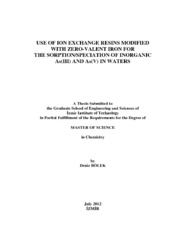Please use this identifier to cite or link to this item:
https://hdl.handle.net/11147/3478Full metadata record
| DC Field | Value | Language |
|---|---|---|
| dc.contributor.advisor | Eroğlu, Ahmet Emin | en |
| dc.contributor.author | Bölek, Deniz | - |
| dc.date.accessioned | 2014-07-22T13:51:37Z | - |
| dc.date.available | 2014-07-22T13:51:37Z | - |
| dc.date.issued | 2012 | en |
| dc.identifier.uri | http://hdl.handle.net/11147/3478 | - |
| dc.description | Thesis (Master)--İzmir Institute of Technology, Chemistry, İzmir, 2012 | en |
| dc.description | Includes bibliographical references (leaves: 72-77) | en |
| dc.description | Text in English; Abstract: Turkish and English | en |
| dc.description | xii, 77 leaves | en |
| dc.description | Full text release delayed at author's request until 2015.08.14 | en |
| dc.description.abstract | Arsenic is a cumulative toxic element and according to Environmental Protection Agency its maximum admissible concentration is established as 10.0 μgL-1 in drinking water. The consumption of arsenic via drinking contaminated water causes chronic and acute poisoning which result in different cancer types. Therefore, determination, speciation and removal of arsenic compounds from waters are important. This study aims to develop a novel sorbent for removal of inorganic arsenic species from contaminated waters. For this purpose a strong anion exchange resin (Amberlite IRA 458) was modified with zero valent iron (ZVI). In the first part of the study, various commercial anion exchange resins and novel resins prepared in the study were used for sorption and speciation of inorganic arsenic. For all the sorbents, the optimized sorption parameters were determined to be 25 ˚C for sorption temperature, 50.0 mg for sorbent amount, 60 min for shaking time for 20.0 mL of 100.0 μgL-1 of arsenic species. The release of As(III) and As(V) from the sorbents was realized using two eluents, 2% (m/v) NaOH + 3% (m/v) NaCl and 5% (m/v) NaOH + 3% (m/v) NaCl, respectively. The accuracy of the proposed methodology was verified with sorption studies for various water types spiked with 100.0 μgL-1 As(III) and As(V). Sorption values of ZVI-IRA 458 were determined to range between 59.1% and 100% for As(III) and between 61.5% and 100% for As(V). Moreover, the sorption efficiencies of the novel sorbents were compared with those of the commercial sorbents.In the final part of the study, the sorption results demonstrated that the most effective immobilization method was NaBH4 reduction and the most efficient resin to be modified was Amberlite IRA 458. Also, the sorption characteristic of ZVI-modified resins showed that the removal efficiency depended on the type of resins and arsenic species in water. | en |
| dc.language.iso | en | en_US |
| dc.publisher | Izmir Institute of Technology | en_US |
| dc.rights | info:eu-repo/semantics/openAccess | en_US |
| dc.subject.lcsh | Drinking water--Arsenic content | en |
| dc.subject.lcsh | Arsenic | en |
| dc.subject.lcsh | Ion exchange | en |
| dc.title | Use of ion exchange resins modified with zero-valent iron for the sorption/speciation of inorganic As(III) and As(V) in waters | en_US |
| dc.type | Master Thesis | en_US |
| dc.institutionauthor | Bölek, Deniz | - |
| dc.department | Thesis (Master)--İzmir Institute of Technology, Chemistry | en_US |
| dc.relation.publicationcategory | Tez | en_US |
| item.languageiso639-1 | en | - |
| item.grantfulltext | open | - |
| item.openairetype | Master Thesis | - |
| item.cerifentitytype | Publications | - |
| item.fulltext | With Fulltext | - |
| item.openairecristype | http://purl.org/coar/resource_type/c_18cf | - |
| Appears in Collections: | Master Degree / Yüksek Lisans Tezleri | |
Files in This Item:
| File | Description | Size | Format | |
|---|---|---|---|---|
| 440851.pdf | MasterThesis | 2.55 MB | Adobe PDF |  View/Open |
CORE Recommender
Page view(s)
196
checked on Sep 23, 2024
Download(s)
84
checked on Sep 23, 2024
Google ScholarTM
Check
Items in GCRIS Repository are protected by copyright, with all rights reserved, unless otherwise indicated.